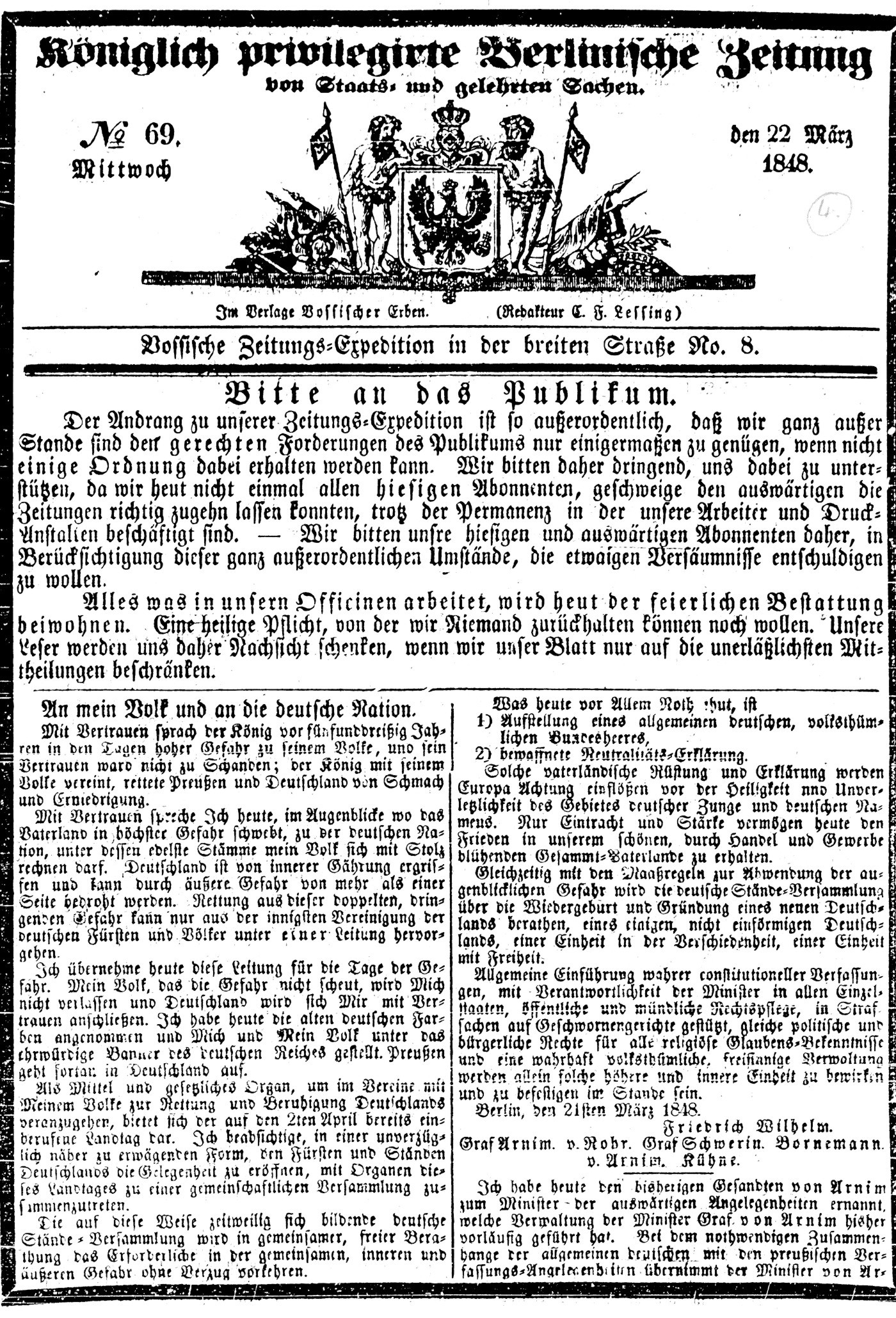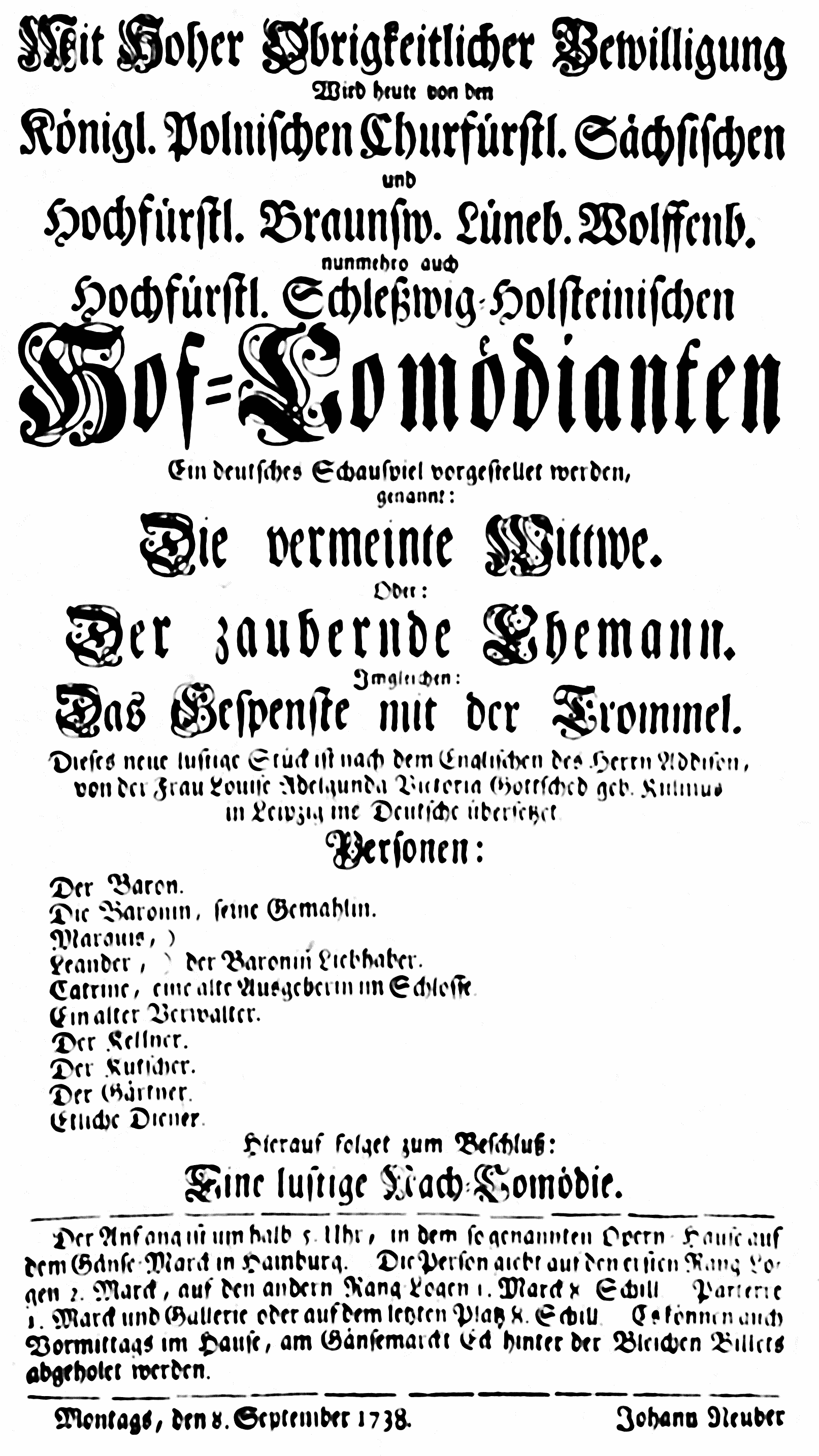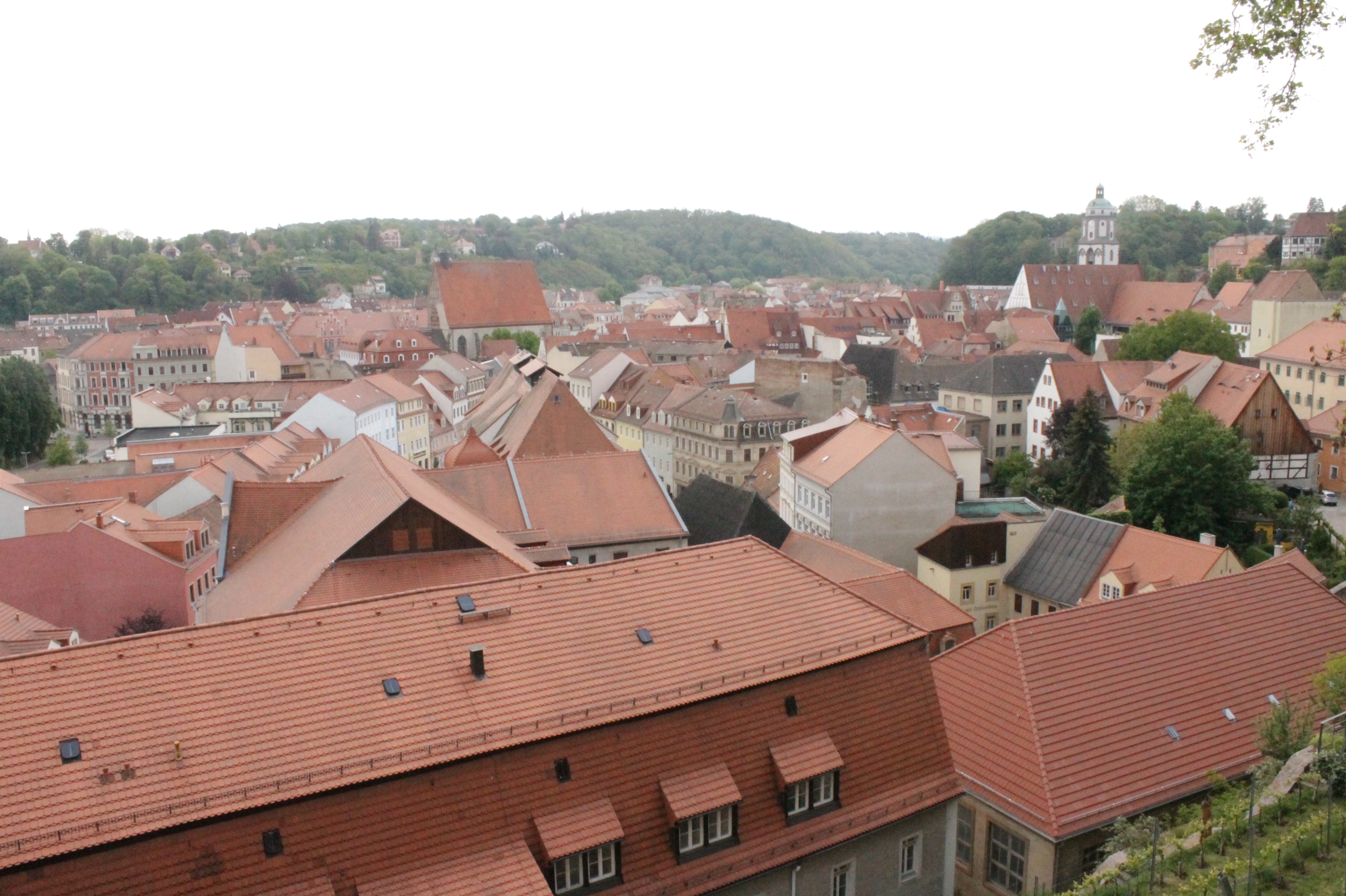|
Gotthold Ephraim Lessing
Gotthold Ephraim Lessing (, ; 22 January 1729 – 15 February 1781) was a philosopher, dramatist, publicist and art critic, and a representative of the Enlightenment era. His plays and theoretical writings substantially influenced the development of German literature. He is widely considered by theatre historians to be the first dramaturg in his role at Abel Seyler's Hamburg National Theatre. Life Lessing was born in Kamenz, a small town in Saxony, to Johann Gottfried Lessing and Justine Salome Feller. His father was a Lutheran minister and wrote on theology. Young Lessing studied at the Latin School in Kamenz from 1737 to 1741. With a father who wanted his son to follow in his footsteps, Lessing next attended the Fürstenschule St. Afra in Meissen. After completing his education at St. Afra's, he enrolled at the University of Leipzig where he pursued a degree in theology, medicine, philosophy, and philology (1746–1748). It was here that his relationship with Karoline N ... [...More Info...] [...Related Items...] OR: [Wikipedia] [Google] [Baidu] |
Anna Rosina De Gasc
Anna may refer to: People Surname and given name * Anna (name) Mononym * Anna the Prophetess, in the Gospel of Luke * Anna (wife of Artabasdos) (fl. 715–773) * Anna (daughter of Boris I) (9th–10th century) * Anna (Anisia) (fl. 1218 to 1221) * Anna of Poland, Countess of Celje (1366–1425) * Anna of Cilli (1386–1416) * Anna, Grand Duchess of Lithuania (died 1418) * Anne of Austria, Landgravine of Thuringia (1432–1462) * Anna of Nassau-Dillenburg (died 1514) * Anna, Duchess of Prussia (1576–1625) * Anna of Russia (1693–1740) * Anna, Lady Miller (1741–1781) * Anna Russell, Duchess of Bedford (1783–1857) * Anna, Lady Barlow (1873–1965) * Anna (feral child) (1932–1942) * Anna (singer) (born 1987) Places Australia * Hundred of Anna, a cadastral district in South Australia Iran * Anna, Fars, a village in Fars Province * Anna, Kohgiluyeh and Boyer-Ahmad, a village in Kohgiluyeh and Boyer-Ahmad Province Russia * Anna, Voronezh Oblast, an urban locality in Voronez ... [...More Info...] [...Related Items...] OR: [Wikipedia] [Google] [Baidu] |
Eva König
Eva König (22nd March 1736 - 10th January 1778) was a German woman letter writer. Life In 1756, she married the Hamburg businessman Engelbert König with whom she had four children: Maria Amalie Henneberg, Theodor, Engelbert, and Fritz. In 1767, she became friends with the playwright Gotthold Ephraim Lessing, godfather to her son Fritz who looked after her when her husband died in 1769. A few years later, in 1771 they became engaged. Due to matters related to König's estate, Eva made several visits to Vienna over a lengthy period. She also had to accompany the young Prince Leopold of Brunswick-Wolfenbüttel, a future Prussian General, to Italy in 1775. As a result, the couple's mode of contact during their engagement was through written correspondence, most of which has survived. In 1776 they were married in Jork, a town near Hamburg. Eva Lessing then moved to Wolfenbüttel with her husband where she died in 1778 at the age of 41 of neonatal sepsis Neonatal sepsis is a t ... [...More Info...] [...Related Items...] OR: [Wikipedia] [Google] [Baidu] |
University Of Wittenberg
Martin Luther University of Halle-Wittenberg (german: Martin-Luther-Universität Halle-Wittenberg), also referred to as MLU, is a public, research-oriented university in the cities of Halle and Wittenberg and the largest and oldest university in the German state of Saxony-Anhalt. MLU offers German and international (English) courses leading to academic degrees such as BA, BSc, MA, MSc, doctoral degrees, and Habilitation. The university was created in 1817 through the merger of the University of Wittenberg (founded in 1502) and the University of Halle (founded in 1694). MLU is named after Protestant reformer Martin Luther, who was a professor in Wittenberg. Today, the university campus is located in Halle, while ''Leucorea Foundation'' in Wittenberg serves as MLU's convention centre. Both Halle and Wittenberg are about one hour from Berlin via the Berlin–Halle railway, which offers Intercity-Express (ICE) trains. History University of Wittenberg (''Universität Wittenbe ... [...More Info...] [...Related Items...] OR: [Wikipedia] [Google] [Baidu] |
Vossische Zeitung
The (''Voss's Newspaper'') was a nationally-known Berlin newspaper that represented the interests of the liberal middle class. It was also generally regarded as Germany's national newspaper of record. In the Berlin press it held a special role due to the fact that by way of its direct predecessors it was the oldest newspaper in the city. The name went back to Christian Friedrich Voss, who was its owner from 1751 to 1795, but became its official name only after 1911. It ceased publication in 1934 under pressure from the Nazi state. Beginnings in Berlin In the early 17th century Christoff Frischmann collected and passed on to interested parties the news he received as postmaster of the Electorate of Brandenburg. Over time he systematized his news gathering, and he was ultimately given a mandate to maintain contacts throughout the " Holy Roman Empire of the German Nation" and to collect news from all important locations. His first printed newspapers came out in 1617 and appeared w ... [...More Info...] [...Related Items...] OR: [Wikipedia] [Google] [Baidu] |
Berlin
Berlin ( , ) is the capital and List of cities in Germany by population, largest city of Germany by both area and population. Its 3.7 million inhabitants make it the European Union's List of cities in the European Union by population within city limits, most populous city, according to population within city limits. One of Germany's States of Germany, sixteen constituent states, Berlin is surrounded by the Brandenburg, State of Brandenburg and contiguous with Potsdam, Brandenburg's capital. Berlin's urban area, which has a population of around 4.5 million, is the second most populous urban area in Germany after the Ruhr. The Berlin/Brandenburg Metropolitan Region, Berlin-Brandenburg capital region has around 6.2 million inhabitants and is Metropolitan regions in Germany, Germany's third-largest metropolitan region after the Rhine-Ruhr and Frankfurt Rhine-Main, Rhine-Main regions. Berlin straddles the banks of the Spree (river), Spree, which flows into the Havel (a tributary of ... [...More Info...] [...Related Items...] OR: [Wikipedia] [Google] [Baidu] |
Friederike Caroline Neuber
Friederike Caroline Neuber, née Friederike Caroline Weissenborn, also known as Friedericke Karoline Neuber, Frederika Neuber, Karoline Neuber, Carolina Neuber, Frau Neuber, and ''Die Neuberin'' (9 March 1697 – 30 November 1760), was a German actress and theatre director. She is considered one of the most famous actresses and actor-managers in the history of the German theatre, "influential in the development of modern German theatre." Neuber also worked to improve the social and artistic status of German actors and actresses, emphasizing naturalistic technique. During a time when theatrical managers in Germany were predominantly men, Caroline Neuber stands out in history as a remarkably ambitious woman who, during her 25-year career, was able to alter theatrical history, elevating the status of German theatre alongside of Germany's most important male theatrical leaders at the time, such as "her actor-manager husband Johann, the popular stage fool Johann Müller, the major act ... [...More Info...] [...Related Items...] OR: [Wikipedia] [Google] [Baidu] |
Leipzig
Leipzig ( , ; Upper Saxon: ) is the most populous city in the German state of Saxony. Leipzig's population of 605,407 inhabitants (1.1 million in the larger urban zone) as of 2021 places the city as Germany's eighth most populous, as well as the second most populous city in the area of the former East Germany after (East) Berlin. Together with Halle (Saale), the city forms the polycentric Leipzig-Halle Conurbation. Between the two cities (in Schkeuditz) lies Leipzig/Halle Airport. Leipzig is located about southwest of Berlin, in the southernmost part of the North German Plain (known as Leipzig Bay), at the confluence of the White Elster River (progression: ) and two of its tributaries: the Pleiße and the Parthe. The name of the city and those of many of its boroughs are of Slavic origin. Leipzig has been a trade city since at least the time of the Holy Roman Empire. The city sits at the intersection of the Via Regia and the Via Imperii, two important medieval ... [...More Info...] [...Related Items...] OR: [Wikipedia] [Google] [Baidu] |
Meissen
Meissen (in German orthography: ''Meißen'', ) is a town of approximately 30,000 about northwest of Dresden on both banks of the Elbe river in the Free State of Saxony, in eastern Germany. Meissen is the home of Meissen porcelain, the Albrechtsburg castle, the Gothic Meissen Cathedral and the Meissen Frauenkirche. The ''Große Kreisstadt'' is the capital of the Meissen district. Names * german: Meißen * french: Meissen, ou, selon l'orthographe allemande: ''Meißen''; en français suranné: ''Misnie'' * la, Misnia, Misena, Misnensium * pl, Miśnia * cs, Míšeň * hsb, Mišno * dsb, Mišnjo * zh, 迈森 (pinyin: ) History Meissen is sometimes known as the "cradle of Saxony". It grew out of the early West Slavic settlement of ''Misni'' inhabited by Glomatians and was founded as a German town by King Henry the Fowler in 929. In 968, the Diocese of Meissen was founded, and Meissen became the episcopal see of a bishop. The Catholic bishopric was suppressed in 1581 ... [...More Info...] [...Related Items...] OR: [Wikipedia] [Google] [Baidu] |
Sächsisches Landesgymnasium Sankt Afra Zu Meißen
Sächsisches Landesgymnasium Sankt Afra zu Meißen is a boarding school for highly gifted students in the German city of Meissen, Saxony. Founded in 1543 as ''Fürstliche Landesschule'' and re-established in 2001, the stated aim of the school is to promote the intellectual and social development of highly gifted students. The costs for attending the school comply with the maxim of social balance; the boarding and schooling fees are considerably low in contrast to similar institutions. It is the first publicly funded school for highly gifted students in Germany and is a role model for similar schools. The school has no official English name. Its German name translates to "Saxon State Gymnasium Saint Afra in Meissen", and is derived from the former Augustinian monastery of the Canons Regular that had been built around the local Saint Afra church. Notable students and professors Students * Petrus Albinus * Karl Salomo Zachariae von Lingenthal * Christian Fürchtegott Gellert ... [...More Info...] [...Related Items...] OR: [Wikipedia] [Google] [Baidu] |
Gotthold Ephraim Lessing Kunstsammlung Uni Leipzig
Gotthold is a name of German origin. People with the name include: People with the given name *Gotthold Eisenstein (1823–1852), German mathematician * Gotthold Gloger (1924–2001), German writer and painter * Samuel Gotthold Lange (1711-1781), German poet * Gotthold Ephraim Lessing (1729—1781), German writer, philosopher, dramatist, publicist, and art critic * Gotthold Salomon (1784-1862), German rabbi, politician and Bible translator. *Gotthold Schwarz (born 1952), German bass-baritone singer and conductor People with the surname * Helene Gotthold (1896–1944), a Jehovah's Witness executed by the Nazis See also * Grube Gotthold, a former mine in eastern Germany * Gottfried * Gotthelf, Gotthilf * Gottheil * Gottlieb * Gottschalk, Gottschall Gottschall is a German surname meaning "God's echo". Notable people with the surname include: * Elaine Gottschall (1921–2005), American proponent of the specific carbohydrate diet * Joan B. Gottschall (born 1947), United States ... [...More Info...] [...Related Items...] OR: [Wikipedia] [Google] [Baidu] |
German Literature
German literature () comprises those literary texts written in the German language. This includes literature written in Germany, Austria, the German parts of Switzerland and Belgium, Liechtenstein, Luxembourg, South Tyrol in Italy and to a lesser extent works of the German diaspora. German literature of the modern period is mostly in Standard German, but there are some currents of literature influenced to a greater or lesser degree by dialects (e.g. Alemannic). Medieval German literature is literature written in Germany, stretching from the Carolingian dynasty; various dates have been given for the end of the German literary Middle Ages, the Reformation (1517) being the last possible cut-off point. The Old High German period is reckoned to run until about the mid-11th century; the most famous works are the '' Hildebrandslied'' and a heroic epic known as the '' Heliand''. Middle High German starts in the 12th century; the key works include '' The Ring'' (ca. 1410) and the poems ... [...More Info...] [...Related Items...] OR: [Wikipedia] [Google] [Baidu] |






